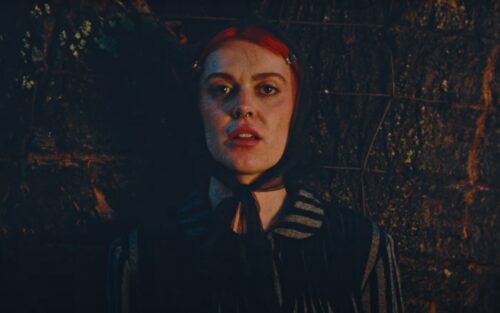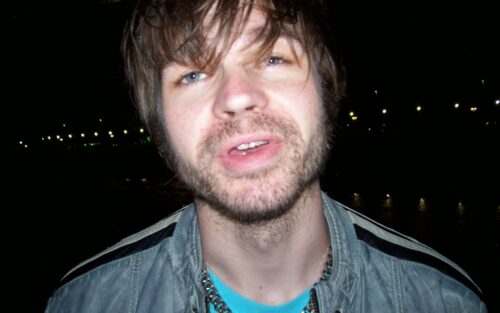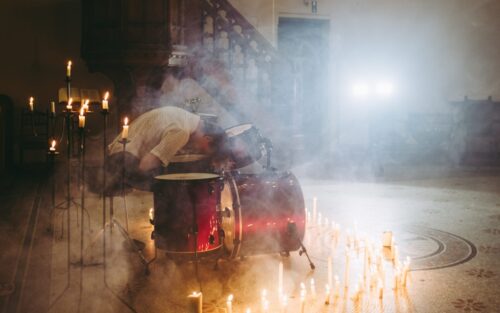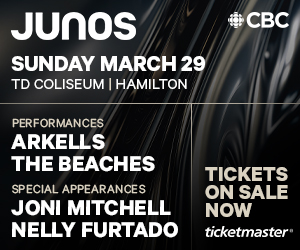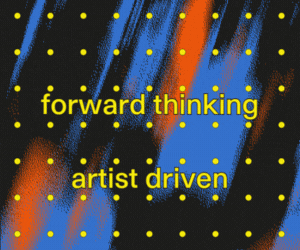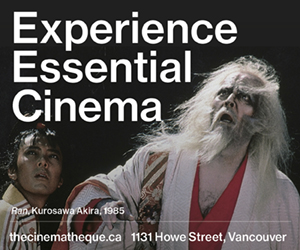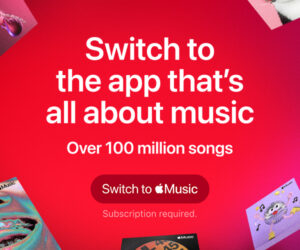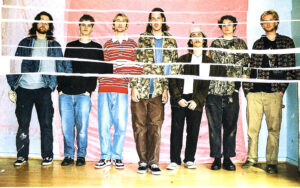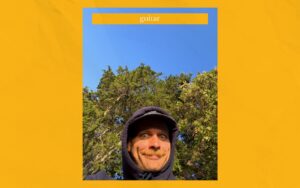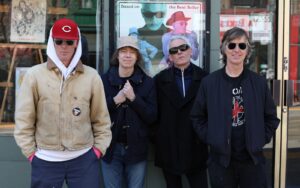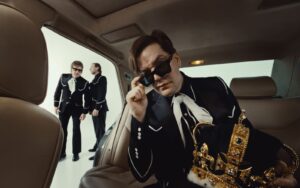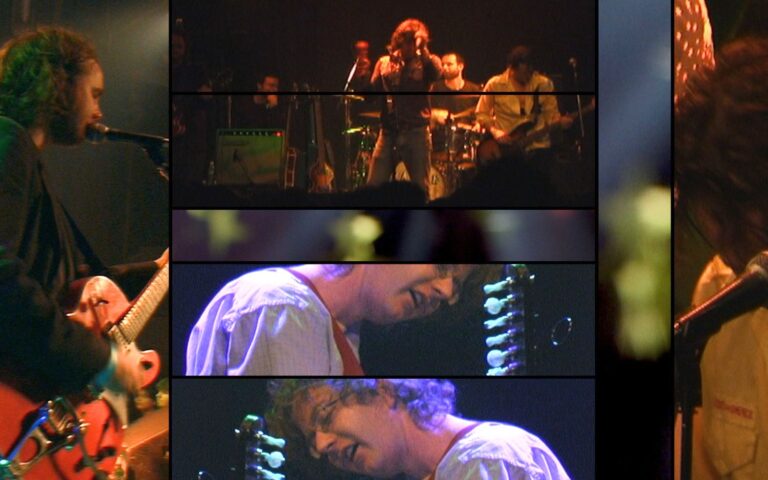
It’s All Gonna Break: The Uncensored Story of Broken Social Scene
Co-founders Kevin Drew and Brendan Canning reflect on the early days of the band, their evolving city, and the making of their new documentary.
by Prabhjot Bains
- Published on
To tell the story of Broken Social Scene is to tell the tale of Toronto, the cold, scruffy, and vibrant city that birthed the indie rock behemoth that brought us undeniable hits over the years including “Anthems For A Seventeen Year-Old Girl,” “7/4 Shoreline,” and of course, “Lover’s Spit.” After all, the collective’s ever-growing rolodex of members is more emblematic of a symphonic community than anything resembling a band.
Using intimate, never-before-seen footage, the troupe’s new documentary, It’s All Gonna Break, not only captures Broken Social Scene’s journey from their humble inception to indie stardom, but also offers a warm, hazy snapshot of Toronto in the early aughts. Whether it be a jam session at producer Dave Newfield’s musty Stars and Suns Studio or a rowdy concert at Ted’s Wrecking Yard—a long-gone venue that kindled the City’s status as a music hub—director Stephen Chung, who is also a long-time friend of the ensemble, immerses viewers in the milieu of an outsider art scene lost to time.
Co-founders Kevin Drew and Brendan Canning echo this same sentiment, telling RANGE that the spirit and feeling of places like Kensington Market or Queen Street West have changed in more ways than one. “I’ll open with a word called community,” says Drew, as he prepares to take a cold plunge at his home just outside the city. Art was everywhere back then, and it was a convergence of our friends and even people like director Stephen Chung that led to everything.”
But for Drew, the fleeting magic of that final analog era boils down to cold hard economics. “It was cheaper if that’s what you want to get down to; the class system was different in the city and the opportunities were different,” he says. Canning adds “The coffee revolution hadn’t started yet…six bucks for a coffee makes the whole infrastructure of music completely different, because it went from people buying albums to people buying coffee.”
He continues, “I feel for younger bands because we made cassette tapes and people bought them and now it’s dependent on Spotify… so the gatekeeper aspect has shifted.” Drew states that the “dominance has come down to real estate…when you dismiss entire neighbourhoods that built community, art, and togetherness, and if you can’t afford to live in them, well, where do you go?” It’s an outlook that reverberates, especially as Canning continues the interview in a car parked near The Well—Toronto’s pricey and swanky new condo complex.

Chung imbues It’s All Gonna Break with a flurry of hazy split screens, a kaleidoscopic visual motif that allows the past and present to unfold at once, featuring members like Leslie Feist reminiscing on recording sessions or concerts as they unfold on the opposite side of the frame. As if caught in the flux of time and space, Chung’s film places audiences in the aether of both being in the moment and looking back at it.
The effect pulls us closer into the headspace of Broken Social Scene at pivotal moments, but for Drew and Canning, it serves as a direct portal to life-defining moments—like their set at Lollapalooza 2006. “For me, I took that as a moment to make sure I was alive,” Drew says. “After that, it was tough to keep going because, for me, it felt like that was the bullseye.”

“Lollapalooza felt like the peak of our career in some ways, but we’ve had other peaks in Central Park in 2010 or playing to two-thousand people in Singapore,” Canning continues. “The whole film conjures up those feelings.”
Chung structures It’s All Gonna Break directly around his own experiences with the band, using their original rejection of the 2007 cut of the film as a narrative device. Broken Social Scene originally had no grandstanding plans to do anything with the footage. “We were never that calculated,” says Canning. “We were far too interested in living in the moment and not getting hemmed in on making sure it’s all documented. Our lives are important, but so are other lives.” As he plunks into his ice bath, Drew notes “We came from a manifesto of making it mysterious, because the bands I loved in the first half of the ‘90s and coming into the aughts, I loved the mysteriousness of them, not knowing who they were as individuals. As reality TV was starting to take over, I felt it was important to not ruin the music with personality.”

“This theme was in You Forgot it in People with the brown bags over our heads,” Drew continues. “As success comes, you start to fight for what little parts of your life can remain private.” This same feeling was the driving force behind the band’s rejection of Chung’s original cut.
“When Stephen made his first cut, and I haven’t really said this to anyone yet, he filmed me driving to my house, talking to my mom (who passed in July 2023), and then five minutes of me playing with my dog on the ground, and I thought it shouldn’t individualize things within this band,” Drew says. “Of course we all are individuals with different beliefs, but you have to be this team when it’s Broken Social Scene—it’s not I, it’s we. Anytime I ever failed this band was when I started to say I, and I can’t represent 12 to 17 people with what I think the answers are.”

Drew says that the decision to shelve the initial version of the documentary crushed Stephen, but that rejection inevitably allowed him to create the film we see today. “It was the footage that ended up telling the story. It was the footage that dictated the protection of our truth,” he says. “We did get push back; people asked where’s the drama, the celebrities, and the fans saying they love us, but we didn’t want an outside source to tell the story. I love the aspect that it stays in the realm of friendship and talks about a city that helped make us happen all over the place.”
It’s rare to find a documentary and its subject take such a similar journey, adjusting and evolving over time to maintain the ability to tell (or sing) their story on their terms. Now well and truly out of the cold plunge, Drew—and the rest of Broken Social Scene—wouldn’t have it any other way, defiantly proclaiming “If you wait around for people to tell you how to do it, you won’t do it.”
It’s All Gonna Break Premieres at Hot Docs Cinema in Toronto on Jan 24 and opens Jan 31 at the VIFF Centre in Vancouver.
By Stephan Boissonneault
Nate Amos revisits a decade of stray ideas and turns them into his most compelling record yet.
By Khagan Aslanov
Mike Wallace’s electro-punk project premieres the hypnotic, percussion-driven video for "Certain Days."

